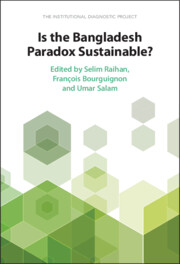The vital importance of institutions for economic development is widely acknowledged in both the theoretical and empirical literature. Yet, the precise nature of the relationship between the two is unclear: do ‘good’ institutions produce development, or does development lead to ‘good’ institutions? The Economic Development and Institutions (EDI) research programme, funded by the UK Foreign, Commonwealth, Development Office (FCDO), formerly Department for International Development (DFID), aims to investigate that relationship and to develop an ‘institutional diagnostic’ framework that can help us understand better the nature of institutional impediments to development, and identify ways of attenuating them. In this study under the EDI research programme, the South Asian Network on Economic Modeling (SANEM), a Dhaka-based research organisation and think-tank, in collaboration with Oxford Policy Management, has carried out such a diagnostic of Bangladesh institutions, which aims to identify weak institutional areas that restrict development and suggest appropriate directions for reform.
Bangladesh’s economic growth and development performance over the past five decades have been impressive. With the poor quality of institutions, such performance has often been termed a ‘development surprise’ or the ‘Bangladesh paradox’. But is it actually a ‘surprise’ or a ‘paradox’? This Bangladesh institutional diagnostic provides an elaborated and convincing answer to this question by analysing the characteristics of the country’s growth and development processes, exploring the key institutional features in these processes, unearthing major institutional weaknesses, and proposing associated reforms for future sustained and inclusive development.
The diagnostic of institutions in Bangladesh suggests that the secret to understanding the importance of critical institutional reforms for growth and development is to consider the factors that connect economic and social outcomes to structural characteristics of the economy and the underlying political economy dynamics. The diagnostic proceeds in several stages. After a thorough study of Bangladesh’s development challenges, along with qualitative research into the opinions of the main stakeholders, a number of critical areas were identified: the ready-made garments sector and, most importantly, the lack of progress in export diversification; regulation of the banking sector and the problem of non-performing loans; the tax system and the exceedingly low capacity for revenue mobilisation; primary education as an important component of public expenditure but also as a key part of human capital accumulation; the management of land issues, in particular, the administration of special economic zones; and the judiciary, especially its limited capacity to handle cases of land-grabbing. Each of these areas is the subject of a ‘deep-dive’ thematic analysis undertaken by Bangladeshi academics, along with discussions of these analyses by international experts. In each of these areas, interrelated proximate causes for identified institutional weaknesses were sought for and their deep factors were scrutinised. The concluding ‘synthesis’ chapter combines these findings to examine the causal connections that determine how institutions work in Bangladesh, and how they impact development, and, finally, what this means for reform.



